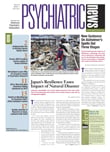Fourteen percent of elderly nursing home residents had Medicare claims for atypical antipsychotic drugs, according to a report released last month by the Office of Inspector General (OIG) of the Department of Health and Human Services.
Of the 2.1 million elderly nursing home residents, 304,983 had at least one Medicare claim for an atypical antipsychotic drug from January 1, 2007, through June 30, 2007. Claims for elderly nursing home residents accounted for 20 percent of the total 8.5 million claims for atypical antipsychotic drugs for all Medicare beneficiaries during the review period.
A spokesperson for the OIG told Psychiatric News that the report, which relied on Medicare claims data, does not include information about the prescribing physicians—whether they were primary care physicians, psychiatrists, or other specialists.
The report was issued in response to a request by Sen. Charles Grassley (R-Iowa) to evaluate the extent to which elderly nursing home residents receive atypical antipsychotic medications and the associated cost to Medicare.
The OIG used Medicare claims data from Part B and Part D to identify claims and payments for atypical antipsychotic drugs for elderly nursing home residents aged 65 or older during the study period. Using medical-record documentation, OIG reviewers determined the extent to which these drugs were provided to residents diagnosed with conditions that were off label and/or specified in the boxed warning. Based on medical reviewers' responses, the OIG also determined whether drugs associated with these claims were provided in compliance with standards for drug therapy in nursing homes by the Centers for Medicare and Medicaid Services (see
Next Steps).
The OIG found that 83 percent of Medicare claims—almost 1.4 million claims—for atypical antipsychotic medications for elderly nursing home residents were prescribed for off-label conditions.
Additionally, the OIG determined that more than 726,000 of the 1.4 million atypical antipsychotic medication claims for elderly nursing home residents did not comply with Medicare reimbursement criteria. The drugs were either off label or not documented as having been administered to the elderly nursing home residents.
In an editorial on the OIG Web site, Inspector General Daniel Levinson said the most alarming finding was the number of antipsychotic prescriptions for elderly people with dementia.
"Despite the fact that it is potentially lethal to prescribe antipsychotics to patients with dementia, there's ample evidence that some drug companies aggressively marketed their products toward such populations, putting profits before safety," he wrote. "Government, taxpayers, nursing home residents, as well as their families and caregivers, should be outraged and seek solutions.
"[A]lthough most physicians and nursing homes dispense antipsychotic drugs with the best interests of patients in mind, it is of great concern that so many nursing home residents are prescribed these drugs in the first place. The report didn't explore this issue, but a series of lawsuits and settlements that DHHS [Department of Health and Human Services] helped bring about suggest that many pharmaceutical companies have improperly promoted these drugs to doctors and nursing homes for many years."
Levinson said physicians, nursing homes, family members, government oversight agencies, and drug companies have a role in addressing overprescription of antipsychotic medication in the elderly.
"Doctors should base prescribing decisions on their best medical judgments, weighing scientific evidence and an especially careful analysis when they are prescribing drugs for off-label use," Levinson said. "Nursing homes and pharmacies that serve the elderly should base drug-dispensing decisions on the best interest of the patient, not on improper influence of drug companies.
"Family members of nursing home residents must ask questions about medications that their loved ones take, learning the reasons for their use, proper dosages, and possible side effects," Levinson wrote. "Government must uphold patient safety standards established for nursing homes and combat off-label promotion of these powerful and potentially lethal drugs.
"And drug companies should follow laws designed to protect patients and not promote drugs for unapproved uses—or pay kickbacks to doctors and institutions to influence their prescribing."
